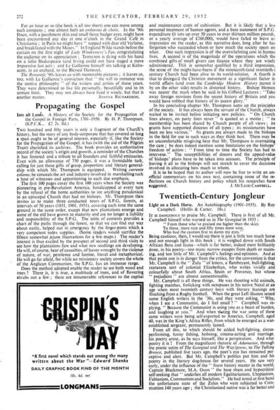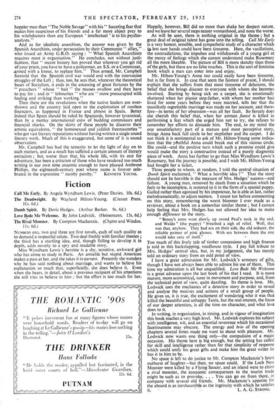Twentieth-Century Jongleur
Light on a Dark Horse. An Autobiography (1901-1935). By Roy Campbell. (Hollis & Carter. 18s.) IT IS DANGEROUS IO praise Mr. Campbell. There is first of all Mr. Campbell himself who warned us in The Georgiad in 1933:
" From those who've praised me higher than the skies To those, more rare and fifty times more wise, Who had the caution first to damn my eyes."
Being cautious, then, I would say there is just a little too much horse and not enough light in this book ; it is weighed down with South African flora and fauna—which is far better, indeed most brilliantly done, in his poetry—too many narrow escapes from death or maim- ing, and too little of Mr. Campbell's feelings and opinions. And at that point one is in danger from the critics, for the convention is that Mr. Campbell is the " Zulu "'of letters, a flamboyant, bull-fighting, rantarara sort of colonial Elizabethan, who writes vividly and colourfully about South Africa, Spain or Provence, but whose " prejudices " are almost unmentionable.
Mr. Campbell is all these things. He was shooting wild animals, fighting mambas, frolicking with octopuses in his native Natal at an age when most twentieth century boys with literary leanings are flinching from a Rugby football. When the great Left illusion seized some English writers in the '30s, and they were asking, "Why, when I see a Communist, do I feel small? " Campbell was re- plying, "Because the Communist is using you as a beast of burden, and laughing at you." And when -during the war some of these same writers were being self-exported to America, Campbell, aged 40, was in-the King's Africa Rifles, from which he emerged as a war- established sergeant, permanently lamed.
From all this, to which should be added bull-fighting, circus- performing, tunny fishing, hoboing, cinema-acting and marriage, his poetry arose, as he says himself, like a perspiration. And what poetry it is From the magnificent rhetoric of Adamastor, through the poetic satire of The Georgiad and The Wayigoose, to The Talking Bronco, published five years ago, the poet's eye has remained per- ceptive and alert. But Mr. Campbell's politics put him and Ins poetry in the literary dog-house for several years. He saw very early, under the influence of the" finest history master in the world, Captain Blackmore, M.A. Oxon" the base sham and hypocritical self-seeking that" underlies all modern Egalitarianism, Utopianism, Fabianism, Communism and Socialism." He had noted at first hand the unfortunate state of the Zulus who were subjected to Com- munism 140 years ago ; the Christianised native was a far better and happier man than "The Noble Savage" with his" haunting fear that makes him suspicious of his friends and a far, more abject prey to his witchdoctors than any European intellectual 'is to his psycho- analysts."
And as for idealistic anarchism, the answer was given by the Spanish Anarchists, under persecution by their Communist" allies," who issued an Army G.R.O. saying : "What Spanish Anarchism requires most is organisation." He concludes, not without justi- fication, that "recent history has proved that wherever you get rid of your priest, you have to have a policeman, an S.S. or a Commissar, .armed with a knout, to replace him." Thus armed, Mr. Campbell foretold that the Spanish civil war would end with the internecine struggles of the Left ; thus, too, he sees that, whatever the theoretical bases of Socialism, it ends in the amassing of great fortunes by the "preachers " whose " bait" the masses swallow and then have to pay for ; and in" labourites "who are "more preoccupied with loafing and striking than working."
Then there are the revolutions when the native leaders are over- thrown and the country laid open to the exploitation of rootless financiers, as happened in France and almost in Spain. Better indeed that Spain should be ruled by Spaniards, however tyrannical, than by a motley international - crew of budding commissars and financial sharks. On the skirts of these people he discerns their artistic equivalents, "the homosexual and yiddish freemasonfies " who got vast literary reputations without having written a single sound literary work. Much of this is exaggerated, but some of it is sound observation.
Mr. Campbell has had the temerity to let the light of day on to such matters, and as a result has suffered a certain amount of literary ostracism ; but, worse than that, his whole life, with its zest for adventure, has been a criticism of those who have rendered too much writing in our own time anaemic enough to have pleased Ambrose Phillips, the eighteenth-century poet whose name is forever cele- brated in the expression " namby pamby." KENNETH YOUNG.



































 Previous page
Previous page